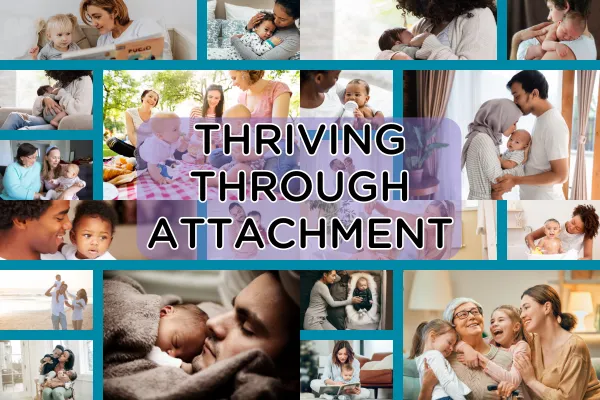General Inquiries: (587) 333-6349 - info@sanostate.com



Thriving Through Attachment: Nurturing Mental Health for New Parents and Caregivers
“If caregivers are doing more than barely surviving and are, in fact, THRIVING, then it has exponentially positive outcomes for the individuals and the infant(s) involved. ” - Kayla Taylor
Parenting is an incredibly rewarding experience, but it can also be overwhelming, especially for new parents or caregivers. There are so many new responsibilities and challenges to navigate, from sleepless nights to financial pressures. While there are many resources available on how to take care of a newborn, one aspect that is often overlooked is the importance of parent-child attachment for positive mental health. Research has shown that the quality of the relationship between a parent and child can have a significant impact on both the child's and the parent's mental health. In this blog, we will explore the surprising link between positive mental health and parent-child attachment, and provide tips for thriving as a new parent or caregiver.
We are hardwired for connection and as a result, we feel safer, more regulated, and more at ease in the presence of secure attachment figures.
Did you know? A caregiver's sensory system helps manage (or co-regulate) an infant’s system as well? For example, physical touch regulates a baby’s hormones and other bodily systems, such as heart rate and temperature.
How? At a brain level. Since the brain is responsible for hormone production and our stress response, positive or negative interactions as an infant affect:
The number of neurons that develop
The complexity of them
The communication among them.
This has a major impact on our cognitive, emotional, and behavioural development.
STRESS. Keep in mind that stress is normal, and a moderate amount can be healthy; short or relenting periods of stress are fine and don’t negatively impact brain development. However, poorly managed stress can have a very detrimental impact and can result in mental health difficulties in both childhood and adulthood.
Another consideration around attachment and stress is that children will attach to caregivers regardless of the care, consistency, and safety that person provides – even if caregivers are neglectful or abusive.
Why? Due to mechanisms of survival and evolution, we have developed a neural network and attachment system that guarantees an infant will attach to a caregiver, regardless of the quality of that caregiving. This aids in our survival because, in the complete absence of caregiving, we wouldn’t survive!
Keep in mind that there are some ‘critical’ periods in development. For instance, it is generally thought that, by one year of age, an infant has formed attachments to, and psychological representations of, their attachment figures. So, this first year of life can be key to establishing healthy and secure attachments. Remember, our brains are amazing, so new attachments can always be learned. This does not mean you must be with your child 100% of the time throughout that first year. It simply means that if parent-child interactions are mostly positive and supportive and the parent can offer a level of physical and emotional attunement to their child, then we are setting our children up for the best success.
Parenting involves a combination of preexisting skills often passed on over generations and new skills learned through experience. If a sensitive caregiver consistently responds to young infants, they become well-adjusted and resilient children and adults. They are also more responsive to improvements in parenting skills over time!
Importantly, I strongly advocate for the support of a new mother and new parents. If caregivers are supported (by sensitive and attuned people), then they feel seen, heard, valued, and taken care of. What follows is that caregivers are then able to exhibit this same attunement toward their children. Think about it this way: If caregivers are doing more than barely surviving and are, in fact, THRIVING, then it has exponentially positive outcomes for the individuals and the infant(s) involved.
So… How can we ensure that caregivers thrive?
One way to reduce stress and increase functioning is through social buffering, which is the idea that positive attachment figures (even just one) can help buffer against the impact of stress and this occurs all throughout childhood and into adulthood. You may have heard the idea that, if a child has at least one positive caregiver in their life (parent, extended family, teacher, etc.), they are at a reduced risk of negative outcomes. This applies throughout the lifespan.
So please consider the following:
If you are about to have a baby or have had one in the last year (or even longer): Reach out to your network and ask for some company, a phone call, a visit, or organize an activity. Bonus points if you get to do this on your own without your little one(s) in tow (not always possible or desired, but does wonders for filling your cup back up and replenishing your soul). This, in turn, helps you and your baby’s development because reducing your own stress (through strong and supportive attachments in your life) increases the odds that you can offer more attuned and connected care to your baby, therefore meeting their attachment needs and increasing development.
If you know someone who’s had a baby anytime in the last year (or even longer): Call, message, drop by with something special… NURTURE the new parents in your life, whether those caregivers are on parental leave or not. This will help not only the individual themselves but also the development of the baby.
Mental health can suffer as a new(er) parent or caregiver, and this can not be understated! It is very difficult to constantly pour into the cup of another human being, a very needy one at that. You MUST find ways to fill your own cup back up (or help another person fill their cup), and doing so will pay off in both direct and indirect ways. Nurture yourself and your loved ones to ensure that nurturing is paid forward.
If you could use guidance or support in this area, click HERE to contact us or call us at 587-333-6349 💙.
Disclaimer
Our content is for informational and educational purposes and is not a replacement for professional advice, diagnosis, or treatment. If you're facing mental health concerns, please seek help from a qualified professional for personalized guidance. Every individual's situation is unique, so use the information here at your discretion. While we strive for accuracy, the field of psychology is ever-evolving, and our content may not always reflect the latest research. Please prioritize your privacy by avoiding sharing personal information in comments or interactions. Your well-being is our top concern, so use our content for educational purposes, but remember to rely on professionals for your specific needs.
Reference
Sullivan RM. The Neurobiology of Attachment to Nurturing and Abusive Caregivers. Hastings Law J. 2012 Aug;63(6):1553-1570. PMID: 24049190; PMCID: PMC3774302.
